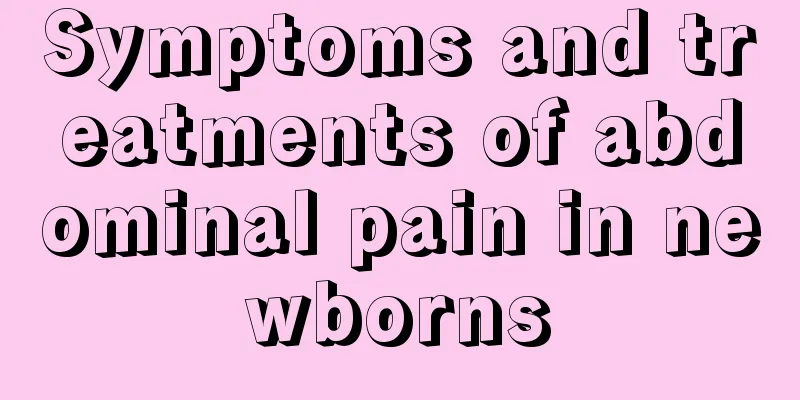Why does drinking breast milk cause diarrhea?

|
Why does drinking breast milk cause diarrhea? If drinking breast milk causes diarrhea, it may be that the baby has gastrointestinal problems, indigestion, or the mothers have eaten something they shouldn’t have, causing the baby to have diarrhea. Mothers need to reflect on their own diet to see if there are any problems. Mothers still need to pay some attention to the baby’s diet. If the baby has diarrhea, go to the hospital for a check-up. Reasonable breastfeeding means feeding at the right time according to the baby's digestive ability. Breastfed babies do not need to stop feeding. They can adjust by simply reducing the amount of feeding, shortening the feeding time, and lengthening the interval between two feedings. Generally speaking, babies under 3 months old should be fed every 3 hours, stopping feeding at night; babies from 3 to 5 months old should be fed every 3.5 hours, and babies after 5 months old should be fed every 4 hours, with each feeding lasting 15 to 20 minutes. Except for feeding time, if the baby cries, you can feed him some boiled water or 5% glucose water. After shortening the feeding time (normal feeding time is 10 minutes per breast, which can be reduced to 5 to 7 minutes), the remaining milk should be squeezed out, because the latter part of the milk has a high fat content and will aggravate the baby's diarrhea. You can also reduce breastfeeding by 1 to 2 times to give the baby's gastrointestinal tract a rest. Stop adding all complementary foods when the baby has diarrhea. As the condition improves, gradually resume the amount of milk that should be fed per day. After the baby's gastrointestinal tract recovers, carefully resume the complementary foods that have been consumed one by one. The nutrients that breastfed babies get from breast milk are closely related to the mother's diet. When a baby has diarrhea, the mother should eat less high-fat food to avoid increasing the fat content in breast milk. Before each feeding, the mother can drink a large bowl of boiled water to dilute the breast milk, which helps alleviate the baby's diarrhea symptoms. The first milk secreted during each breastfeeding is rich in protein and low in fat, and looks lighter. As time goes on, the protein content decreases and the fat content increases, and it looks thicker little by little. For healthy babies, empty one breast first and then the other. Fully emptying the breast can ensure the continuous secretion of milk. For babies with indigestion or diarrhea, we recommend that they only eat the first part of the milk and squeeze out the last part of the milk with high fat content to facilitate digestion. Babies have a limited digestive capacity. If they eat more food than they can handle, they will suffer from diarrhea. Due to differences in eating habits, health conditions and individual differences, the nutrients (mainly fat) contained in some mothers' breast milk exceed the baby's needs, which will cause diarrhea in the baby, which is usually called "physiological diarrhea." If the baby has no other symptoms except increased frequency of bowel movements, has a good appetite, does not vomit, and his growth and development are not affected, then it is not caused by any disease. After adding complementary foods, the bowel movements will gradually return to normal, and the mother does not need to worry too much. Babies with "physiological diarrhea" do not need medication, and generally the effect will be achieved by changing the baby's diet to milk or other dairy products. If you don't want to wean your baby, you can shorten the time of each feeding and let your baby only eat the first half of the milk which is high in protein and low in fat. This can also improve the situation. If necessary, the mother can drink a large cup of light salt water half an hour to an hour before breastfeeding to dilute the breast milk, and then feed the baby. If a baby gets diarrhea after drinking breast milk, it may be caused by many reasons. No matter what the reason is, mothers must eliminate this symptom so that the baby can return to normal and try to let their baby eat healthily. When this happens, you need to know how to solve it. It is best to find out the root cause immediately to avoid harming your baby. |
<<: What should I do if my baby has not recovered from coughing for more than a month?
>>: Why is there redness around the child's lips?
Recommend
What medicine should children take for headache
Headaches are a very common phenomenon among adul...
What are the dietary treatments for high fever in children?
When the body has a fever, it is necessary to cho...
What are the recipes for babies over six months old?
When preparing food for your baby, you cannot do ...
How to prevent swollen lymph nodes behind the ears in children
Swollen lymph nodes behind the ears in children m...
Children with low white blood cell count and recurrent fever
Children's constitution is relatively weak, s...
Causes and solutions for severe coughing in babies
Some babies are prone to coughing, especially at ...
Tips for treating toothache in children
For many adults, toothache is often unbearable be...
What causes effusion?
Hydrocephalus is a common disease in children. It...
Be careful with snoring in children, as the incidence rate is highest at this stage
Snoring in children is very serious. Among every ...
Which department should children go to for bedwetting?
In life, bedwetting in children is generally path...
Blackening of the roots of children's teeth
The blackening of the roots of children's tee...
Baby pollen allergy symptoms
One of the common diseases in the allergy departm...
Baby's stool is like tofu dregs
The baby's stool is actually a way for parent...
Treatment of urinary incontinence in children
Children's urinary incontinence has become a ...
What should I do if my child gets a bruise on his face?
If a child has bruises on his face, we usually kn...









